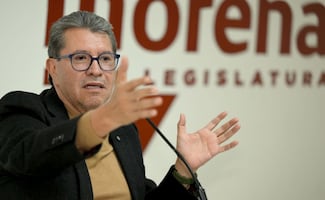Más Información

Monreal señala que errores de Morena afectan directamente a Sheinbaum; advierte fuertes disputas internas

Claves de la nueva reforma laboral paulatina de 40 horas; ¿patrones podrán descontarte salario?, aquí te contamos

Continúa baja de Vicealmirante Roberto de la Marina tras acusación de liderar red de huachicol; juez niega amparo

Noroña se lanza contra Díaz Ayuso tras dichos sobre México; quisieran en Madrid tener a Sheinbaum como gobernante, responde

Felipe Calderón acusa “negligencia criminal” por brote de sarampión; “crisis pudo evitarse”, asegura bancada del PAN

Violencia en Sinaloa se intensifica; mineros desaparecidos, fosas clandestinas y secuestros encienden alertas
Within national politics, suspicions of embezzlement, funds diversions, and corruption of governors from different states of the Republic have become an unfortunate habit regardless of their political party. Moreover, over the course of time, upon terminating their public responsibilities, many of these suspicions have been confirmed through legal proceedings against them.
Only in the last year, and after leaving political power, the public discussion has had former governors of whom there is evidence of corruption as protagonists. They are Guillermo Padrés, from Sonora, of conservative National Action Party (PAN), as well as militants of ruling Institutional Revolutionary Party (PRI) Javier Duarte, from Veracruz; César Duarte, from Chihuahua, and Roberto Borge, from Quintana Roo. Of these, the conservative National Action Party (PAN) member and the first Duarte have faced justice in recent months.
Roberto Borge is the most recent member to join this select group. He was captured last Sunday, June 4 in Panama when he was about to catch a plane to Europe. In the meantime, Mexicans continue to witness a parade of state leaders who, during their government, exercise absolute and unilateral power in the territory that they should manage, and do so generally without counterweights of other powers and subduing critical press.
The Chief Audit Office (ASF), on a recurring basis, publishes its findings on the misuse of public money by the authorities in each of the country's entities. However, many of these indications go without consequences due to the institutional inability to process so many irregularities, as well as the lack of political will to proceed through legal channels. It's a story that never ends.
In any case, what should be pointed out is the way in which governors have public resources under their tutelage and the lack of legal and institutional controls, both within the state as well as the Federation, to avoid abuse. The governor of Quintana Roo, Carlos Joaquín González, expressed the need to recover the state-owned lands that were sold by his predecessor.
But we must go further. If there are so many former governors parading for corruption whose performance in power is suspicious; if many of them diverted public funds from questionable legal figures and if they did business under the cover power, it is worth asking: what is the role played by local powers like the Legislative and the Judiciary?
Moreover, what controls are there today to ensure that those who are in the state power do not damage the patrimony that was entrusted to them at the polls? Beyond the ASF, who is watching the current governors to avoid further corruption scandals when they leave office?
al
Noticias según tus intereses
[Publicidad]
[Publicidad]








